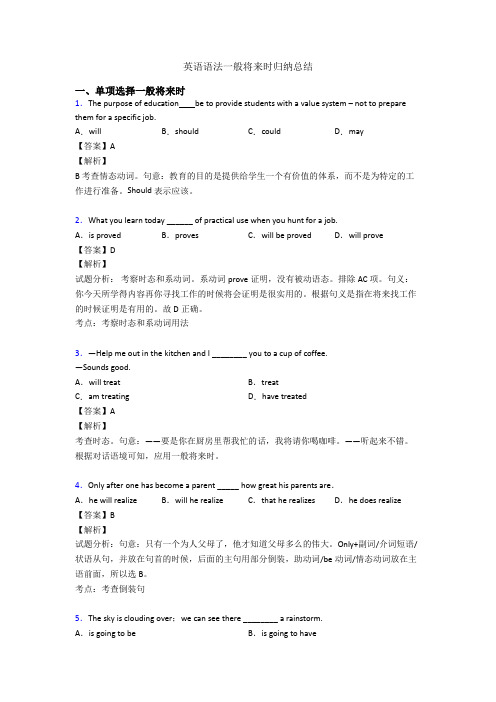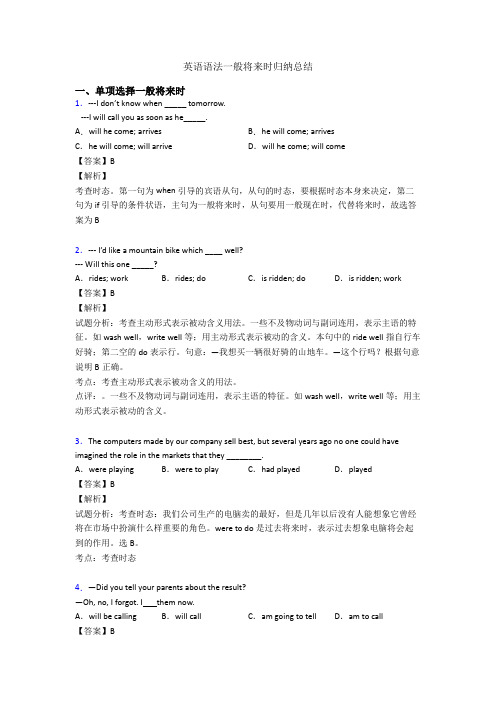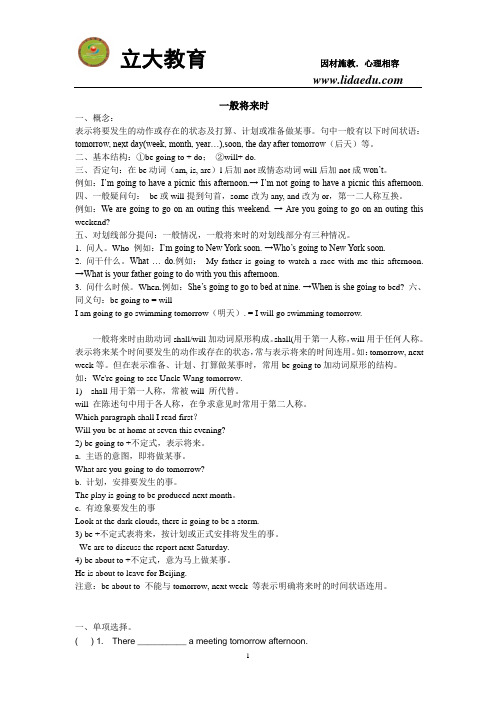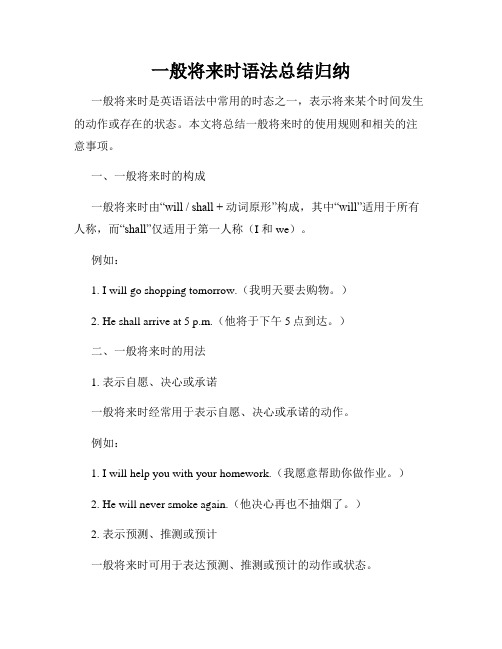英语语法一般将来时归纳总结
【英语】英语语法一般将来时归纳总结

一般将来时
1.表示未来的动作或状态常用will / shall +动词(常与表示将来的时间状语边用如tomorrow、next week等)。
2.表示一种趋向或习惯动作。
例如:We’ll die without air or water.
3.表示趋向行为的动词如come, go, start, begin, leave等词常用进行时的形式表示将来时。
【英语】英语语法一般将来时归纳总结
一、单项选择一般将来时
1.-- How many people are expected to come to your party tomorrow afternoon?
-- I send out thirty invitations but one third _____.
考点:考查动词时态与体态辨析。
14.If their marketing plans succeed, they ________ their sales by 20 percent.
A.will increaseB.have been increasing
C.have increasedD.would be increasing
A.rewardedB.were rewarded
C.will rewardD.will be rewarded
【答案】D
【解析】
【分析】
【详解】
本题考查时态和语态。解题步骤:1.确定时态:根据句尾的in the end可知,事情发生在将来,用将来时。2.确定语态:efforts和reward是被动关系,应该使用被动语态。句意:学生们一直在刻苦பைடு நூலகம்习功课,他们的努力终将会得到回报。综上,用一般将来时的被动,故选D。
高考英语语法一般将来时归纳总结

高考英语语法一般将来时归纳总结一、单项选择一般将来时1.The class teacher was anxious to hear one of his top students _____ because of family move.A.will leave B.is leavingC.was leaving D.has left【答案】C【解析】be doing可以用来表示将来,指按照时间安排表即将发生的事情,是有计划安排的;will do 强调的是主观性,不表达按时间安排表即将发生的事情。
句意:得知班里一个尖子生因为家庭原因要离开学校,班主任很焦虑。
2.A good film producer must make sure that his films ____ fit into the needs of the changing market.A.are to B.will C.are going to D.are about to【答案】A【解析】试题分析:考查将来时的表达法。
Be to do sth表示计划的事情;表示注定要做某事;也可以表示命令做某事,相当于have to, must,should; will表示一般的将来,或者临时决定做某事;be going to do sth表示按照计划安排要做某事;或者根据某种迹象要做某事;be about to do sth即将做某事,不与表示将来时的时间状语连用。
句意:好的电影出品人要确保他的电影应该满足不断变化的市场的需要。
该句中的be to =should.故A正确。
考点:考查将来时的表达法点评:Be to do sth表示计划的事情;表示注定要做某事;也可以表示命令做某事,相当于have to, must,should; will表示一般的将来,或者临时决定做某事;be going to do sth表示按照计划安排要做某事;或者根据某种迹象要做某事;be about to do sth即将做某事,不与表示将来时的时间状语连用。
最新英语语法一般将来时归纳总结

【答案】C
【解析】
试题分析:根据时间状语within 15 years,故用一般将来时。
考点:时态考查题
点评:通过时间状语,上下句意思和具体语境来确定时态。
4.If my brother doesn’t go to the evening party,.
【答案】C
【解析】
试题分析:句意:中国目前的环境状况越来越糟糕,如果我们现在不采取行动来保护环境,我们将会后悔。if引导的条件状语从句,主句为一般将来时态,if从句用一般现在时态,选C。
考点:考查时态
10.— What do you want for breakfast, Joe?
— I think I _______ some bread and milk.
考点:考查时态
7.--- Could you take a message for Mr Brown?
--- Certainly. I ________ him about something else in any case. So it _______ any bother.
A.may see; isn’tB.see; won’t beC.will see; isn’tD.will be seeing; won’t be
考点:考查时态
14.AC Milan has confirmed that the England star David Beckham ______the team soon.
A.has rejoinedB.was going to rejoin
英语语法:一般将来时解释集

英语语法:一般将来时解释大全一、基本定义一般将来时是英语时态的一种,表示将来的动作或状态。
它主要用于描述未来的计划、预测或期望发生的事情。
二、形式构成一般将来时的构成主要有以下几种形式:1. 基本结构:主语+ will /shall + 动词原形+ 其他成分。
这是最基本的一般将来时形式,表示将来的动作或状态。
2. be going to 结构:主语+ be(am, is, are)going to + 动词原形+ 其他成分。
这种结构表示计划或安排将要发生的事情,也可以表示根据目前的迹象或情况预测将会发生的事情。
3. be+动词不定式:主语+ be(am, is, are)to + 动词原形+ 其他成分。
这种结构表示计划或安排将来要做的事情。
4. be+动词ing:主语+ be(am, is, are)+ 动词ing形式+ 其他成分。
这种结构表示即将发生的动作,通常与“when”连用。
5. be+表示时间的介词短语:主语+ be(am, is, are)+ 表示时间的介词短语。
这种结构用于表示将来某个时间点的情况。
6. 将来时间状语:tomorrow, next week, in the future等以上就是一般将来时的主要构成形式。
需要注意的是,在具体使用时,应根据语境和上下文选择合适的构成方式。
三、用法场景1. 表达未来的计划或意图,例如:I will go to the beach next summer.2. 描述未来的预测或期望,例如:It will rain this afternoon.3. 在条件句中表示将来的结果,例如:If you study hard, you will pass the exam.四、与其他时态的区别1. 与现在进行时态的区别:现在进行时态强调正在进行的动作,而一般将来时态强调将来的动作或状态。
2. 与过去时态的区别:过去时态表示过去的动作或状态,与将来时间无关。
英语语法一般将来时归纳总结

C.will contributeD.is contribute
【答案】C
【解析】
试题分析:考查动词的时态。句意:这项工程在竣工后,将会继续发展经济,减少贫穷。根据句意可知表示将要发生的事情,用一般将来时,选C
考点:考查动词的时
考点:考查倒装句和时态
6.— Lucy, how are you getting on with your composition?
— I have rewritten it so many times that I wonder if I ________ it.
A.finishB.finishedC.have finishedD.will finish
考点:考查动词时态。
4.If my brother doesn’t go to the evening party,.
A.neither do IB.I will eitherC.either will ID.nor will I
【答案】D
【解析】
试题分析:考查倒装句:句意:如果我弟弟不去晚会,我也不去。Neither/Nor+倒装句,表示“…也不是”,因为if条件句用一般现在时,代替一般将来时,所以主句是一般将来时,选D。
英语语法一般将来时归纳总结
一、单项选择一般将来时
1.I ________ for Beijing next Saturday. Do you know when the earliest plane ________ on Ssturday?
A.am leaving;takes offB.leave;takes off
初中英语语法一般将来时

一般将来时一.一般将来时的定义:表示将来某一个时间将要发生的动作或存在的状态,表示将来经常或重复发生的动作。
二.一般将来时的标志:tomorrow(明天),the day after tomorrow(后天)next year(明年)next month(T—个月)next week(下一个星期)3.一般将来时的构成:1.主语^be(am,is,are)going to+动词原形+..例如:(1).I am going to play football tomorrow.明天我将要踢足球.(2).She is going to watch a movie the day after tomorrow.后天她要看一场电影.2.主语+will/shall+动词原形+.....说明:(l).will/shall有时可以和be going to互换;(2) .will是万能的,shall只能用在第一人称,主语是I,we.(3) .will和shall的后而接动词原形)例如shall/will go to Beijing next month.。
will=I11)下个月我将要去北京.(2) .You will come to see me tomorrow.(you will=you'll)明天你将要来看我.(3) .She will read English tomorrow moming.(She will=She'll)明天早上她将要读英语.四.句一般将来时的式:1.肯定句:(1) ..主语+be(am,is,are)going to+动词原形+......(2) ..主语+will/shall+动词原形+.....例句和上面一样,就不举了.2.否定句:(1)..主语+be(am,is,are)not going to+动词原形+......例如:(A):I am not going to play basketball tomorrow.明天我不将踢足球.(B).She is not/isn't going to visit Shanghai next year.明年她不将参观上海.(2)..主语+will/shall not+动词原形+.....(A).I shall not go to school the day after tomorrow o后天我不将上学了(B).I will not write my homework this evening.(will notl=I won't)今晚我不将写作业(C).She will not see a movie next week.(will not=won't)下个星期她将不看一场电影.3.一般疑问句:(A).Am/Is,Are+主语+going to+动词原形+....例如(A).—Am I going to see my grandfather tomorrow?明天我将去看我的爷爷吗?—Yes,you are.是的,你将去.(B).— Are you going to listening to the tape tomorrow?明天你将听录音带吗?—No,I am not.不,我不将.(C). —Is she going to Beijing next year? 明年我将去北京吗?-Yes,she is.是的,她将.(2).Will//shall+主语+动词原形+…例如(A). —Shall we play volleyball next class?下一节课我们将打排球吗?-Yes,you will,是的,你们将.(B). —Will you come here next week?下个星期你将来这儿吗?-Yes,I will.是的,我将.(C).--Will she teach us this term?这学期,她将教我们吗?—Yes,she will.是的,她将.4.特殊疑问句:(1).What(Where,How...)+be(am,is,are)+主语+going to+动词原形+...?例如:(A).—What are you going to do tomorrow? 明天你将要做什么?—rm going to the park? 我将要去动物园.(B).--Where are you going to swim? 你将要去哪儿游泳?—I'm going to swim in the river.(2). What(When,Where,How...)+主语+动词原形+...?例如:(A).---What will you do next week?下个星期你将要做什么?--1 will do my homeworko 我将要做作业.(B).—How will she come here tomorrow?明天她将要怎么来这儿?—She will come here by bus 。
一般将来时的知识点归纳

一般将来时的知识点归纳关于一般将来时的知识点,在英语的语法中,一般将来时可以表达或者推测将来发生的动作或状态,主要包括:将来现在完成时(Future Perfect)以及将来简单时(Future Simple),对应着中文中的“将来完成时”、“一般将来时”等概念。
将来完成时由这几种变异组成:将来完成完成式(Future Perfect Continuous)、将来完成式(Future Perfect)、将来完成进行式(Future Perfect Continuous)。
它们的复合形式表达将来某个时间段内完成的动作,几种变异及其语法如下:(1)将来完成式(Future Perfect)语法结构为:will/shall have + 过去分词其用法有:主句用will/shall have,它可以表达将来某一特定时间前发生的动作或状态,而且仍将持续到将来某一时间。
例如:By next week, I will have tidied the room. 到下周时,我将把房间打扫干净。
(2)将来完成进行式(Future Perfect Continuous)语法结构为:will/shall have+ been + 动词-ing 形式其用法有:表示将来某一时间前持续进行的动作。
例如:By the end of this month, I will have been living here for five years. 到本月底,我将已在这里住了5年。
(3)将来简单式(Future Simple)语法结构为:will/shall + 动词原形其用法有:指示将来将发生的事情,即将要发生的动作或意向。
例如:I will call him tomorrow. 我明天会打电话给他。
总之,一般将来时是英语中非常常用的语法时态结构,它可以用来表示将来发生的动作或者将要发生的意向,在英语语法学习中占据了不可忽略的地位。
【英语】英语语法一般将来时归纳总结

【答案】D
【解析】
试题分析:考查倒装句:句意:如果我弟弟不去晚会,我也不去。Neither/Nor+倒装句,表示“…也不是”,因为if条件句用一般现在时,代替一般将来时,所以主句是一般将来时,选D。
【答案】D
【解析】
试题分析:句意:--你能给布朗先生捎个口信吗?--当然,我要为其他什么事情去见他。所以这不麻烦。第一空用将来进行时,表示将来计划,第二空填won’t be“不会”,选D。
考点:考查时态
6.- Will you be available at three o'clock tomorrow afternoon?
【答案】C
【解析】
be doing可以用来表示将来,指按照时间安排表即将发生的事情,是有计划安排的;will do强调的是主观性,不表达按时间安排表即将发生的事情。句意:得知班里一个尖子生因为家庭原因要离开学校,班主任很焦虑。
2.If my brother doesn’t go to the evening party,.
考点:考查时态
5.--- Could you take a message for Mr Brown?
--- Certainly. I ________ him about something else in any case. So it _______ any bother.
A.may see; isn’tB.see; won’t beC.will see; isn’tD.will be seeing; won’t be
17.Why don’t you put the meat in the fridge? It will_______fresh for several days.
英语语法一般将来时归纳总结

—Just fill out this form and we ________what we can do for you.
A.seeB.are seeing
C.have seenD.will see
【答案】D
【解析】
【答案】D
【解析】
试题分析:考察时态和系动词。系动词prove证明,没有被动语态。排除AC项。句义:你今天所学得内容再你寻找工作的时候将会证明是很实用的。根据句义是指在将来找工作的时候证明是有用的。故D正确。
考点:考察时态和系动词用法
3.—Help me out in the kitchen and I ________ you to a cup of coffee.
A.makeB.was makingC.madeD.will make
【答案】D
【解析】
考查时态。句意:你看起来冻坏了。坐在火边,我给你沏一些热茶。可知下文描述的是将来的动作,故用将来时态,选D。
19.—Do you think Mom and Dad ________ late?
—No, Swiss Air is usually on time.
C.have goneD.went
【答案】A
【解析】
从第二人回答的“Really?”可以看出他在此之前并不知道Mike住进医院的事情。所以,今天下午去医院探视就不会是早就有的计划,所以排除B项。
9.—Tom is so joyful that he smiles at everyone.
—So ________ you if you get the first in the exam.
【精品】英语语法一般将来时归纳总结

【精品】英语语法一般将来时归纳总结一、单项选择一般将来时1.Peace is necessary to all. After all, it is the United States and China, as the two largest economies in the world, that ________ most from a peaceful and stable Asia-Pacific.A.are benefited B.will benefitC.will be benefited D.had benefited【答案】B【解析】试题分析:根据语境“美国和中国将受益于一个和平稳定的亚太地区”可知该句要用一般将来时,故选B。
考点:考查时态2.AC Milan has confirmed that the England star David Beckham ______the team soon. A.has rejoined B.was going to rejoinC.rejoined D.is to rejoin【答案】D【解析】试题分析:考查时态。
本句考查的是将来时的一种表达法be to do sth将要做某事;句意:AC米兰俱乐部确认英国球星贝克汉姆将很快就重新加盟该队。
本句的关键词是soon该词经常与将来时连用。
故D正确。
考点:考查将来时的表达法点评:在英语中将来时有多种表达法。
Be to do sth表示计划的事情;或者表示注定要做某事;也可以表示命令做某事,相当于have to, must,should; will表示一般的将来,或者临时决定做某事;be going to do sth表示按照计划安排要做某事;或者根据某种迹象要做某事;be about to do sth即将做某事,不与表示将来时的时间状语连用。
现在进行时表示一般将来时,表示按照计划安排要发生的事情,且动词要是一些表示位置变化的动词。
英语语法一般将来时归纳总结

英语语法一般将来时归纳总结一、单项选择一般将来时1.---Do you have any special plan for this weekend?---Yes. I _____ my daughter to Disneyland.A.am going to take B.take C.have taken D.would take【答案】A【解析】试题分析:考查时态。
根据句中的时间状语this weekend,可以判断用将来时。
英语中经常用现在进行时代替将来时。
句意:——这个周末你有什么特别的计划?——是的,我打算带我女儿去迪斯尼。
故A正确。
考点:考查时态2.AC Milan has confirmed that the England star David Beckham ______the team soon. A.has rejoined B.was going to rejoinC.rejoined D.is to rejoin【答案】D【解析】试题分析:考查时态。
本句考查的是将来时的一种表达法be to do sth将要做某事;句意:AC米兰俱乐部确认英国球星贝克汉姆将很快就重新加盟该队。
本句的关键词是soon该词经常与将来时连用。
故D正确。
考点:考查将来时的表达法点评:在英语中将来时有多种表达法。
Be to do sth表示计划的事情;或者表示注定要做某事;也可以表示命令做某事,相当于have to, must,should; will表示一般的将来,或者临时决定做某事;be going to do sth表示按照计划安排要做某事;或者根据某种迹象要做某事;be about to do sth即将做某事,不与表示将来时的时间状语连用。
现在进行时表示一般将来时,表示按照计划安排要发生的事情,且动词要是一些表示位置变化的动词。
3.—Did you tell your parents about the result?—Oh, no, I forgot. I them now.A.will be calling B.will call C.am going to tell D.am to call【答案】B【解析】句意:A 选项是将来进行时,表示将来某个时间正在进行的动作;B、C、D均表示一般将来时。
英语语法一般将来时归纳总结

【答案】B
【解析】
试题分析:考查主动形式表示被动含义用法。一些不及物动词与副词连用,表示主语的特征。如wash well,write well等;用主动形式表示被动的含义。本句中的ride well指自行车好骑;第二空的do表示行。句意:—我想买一辆很好骑的山地车。—这个行吗?根据句意说明B正确。
【解析】
试题分析:考查倒装句和时态:句意:只有你每天练习几个小时,你才能把钢琴弹好。Only+副词/介词短语/状语从句+主句(主句用部分倒装),而且这句话的时间是every day,所以用一般现在时will,选D。
考点:考查倒装句和时态
6.(吉林长春高中毕业班第一次调研)—Alas! I have left my key to the office in my car.
【答案】D
【解析】
试题分析:句意:我今天下午4点能和你们总经理说话吗?---对不起先生,他很快就去开会了。时间是soon,所以用一般将来时,这里用现在进行时代替一般将来时,所以选D。
考点:考查时态
9.If our marketing plan succeeds, we _______ the sales by thirty percent next year.
18.The audience is waiting anxiously to see which team______.
A.winsB.would win
C.will winD.had win
【答案】C
【解析】
分析句意,可知当时的比赛结果还没出来,故要用一般将来时。根据句意,可知选C。句意:观众们都在焦急地等待着看哪个队伍。
初中英语语法汇总(一般将来时)

初中英语语法汇总(一般将来时)初中英语语法汇总〔一般将来时〕一、一般将来时的定义一般将来时表示在如今看来即将要发生的动作或存在的状态。
常用时间副词tomorrow, soon或短语next year / week / month, in a few days, in the future, sometime 做状语。
二、一般将来时的基本用法及构成〔1〕一般将来时的基本用法是表示单纯的将来事实,由"will / shall + 动词原形'构成:〔shall只用于第一人称〕例句:We shall have a lot of rain next month. 下个月将下许多雨。
I think she will pass the exam. 我想他考试会及格的。
〔2〕"be going to+动词原形'用来表示事先考虑过的将要发生的动作以及已有迹象说明必将要发生的某事,意为"准备;就要'。
如:1. Were going to meet outside the school gate. 我们准备在校门口见面。
2. Look! Its going to rain. 瞧!快下雨了。
(3) 用"be to+动词原形'表示。
主要表示按打算或支配即将要发生的动作;有时也表示指令、禁止或可能性:He is to leave for Beijing tomorrow. 他确定明天去北京。
Tell him hes not to be back late. 告知他不准迟回。
(4) 用"be about to+动词原形'表示。
主要表示即将要发生的事:He is about to leave. 他即将要离开。
Sit down, everyone. The film is about to start. 大家坐好,电影马上就要开发始了。
注:该结构通常不与具体的时间状语连用:误:He is about to leave soon [tomorrow].另外,该结构在美国英语中还可表示"准备'(主要用于否认句):Im not about to lend him any more money. 我不准备再借给他任何钱。
【英语】英语语法一般将来时归纳总结

点评:在英语中将来时有多种表达法。Be to do sth表示计划的事情;或者表示注定要做某事;也可以表示命令做某事,相当于have to, must,should; will表示一般的将来,或者临时决定做某事;be going to do sth表示按照计划安排要做某事;或者根据某种迹象要做某事;be about to do sth即将做某事,不与表示将来时的时间状语连用。现在进行时表示一般将来时,表示按照计划安排要发生的事情,且动词要是一些表示位置变化的动词。
考点:考查时态
12.(东北三校一模)I am certain by no means ________ his word since he has promised an amount of money to the poor.
A.he will breakB.will he break
C.brokeD.did he break
A.will increaseB.have been increasing
C.have increasedD.would be increasing
【答案】A
【解析】
句意:要是他们的市场计划成功了,他们将增加20%的销售额。从句是一般现在时表将来,主句常用一般将来时或情态动词can/may+动词原形。
【英语】英语语法一般将来时归纳总结
一、单项选择一般将来时
1.—How can I apply for an online course?
—Just fill out this form and we ________what we can do for you.
A.seeB.are seeing
C.hav固定句式:it be一段时间before从句;当Before引导的时间状语从句中使用一般现在时的时候,前面的主句使用将来时。May放在句首,运用倒装句表示对对方的祝愿。
英语语法大攻克--一般将来时(整理)

一般将来时一、概念:表示将要发生的动作或存在的状态及打算、计划或准备做某事。
句中一般有以下时间状语:tomorrow, next day(week, month, year…),soon, the day after tomorrow(后天)等。
二、基本结构:①be going to + do;②will+ do.三、否定句:在be动词(am, is, are)l后加not或情态动词will后加not成won’t。
例如:I’m going to have a picnic this afternoon.→ I’m not going to have a picnic this afternoon.四、一般疑问句:be或will提到句首,some改为any, and改为or,第一二人称互换。
例如:We are going to go on an outing this weekend. → Are you going to go on an outing this weekend?五、对划线部分提问:一般情况,一般将来时的对划线部分有三种情况。
1. 问人。
Who 例如:I’m going to New York soon. →Who’s going to New York soon.2. 问干什么。
What … do.例如:My father is going to watch a race with me this afternoon. →What is your father going to do with you this afternoon.3. 问什么时候。
When.例如:She’s going to go to bed at nine. →When is she goi ng to bed? 六、同义句:be going to = willI am going to go swimming tomorrow(明天). = I will go swimming tomorrow.一般将来时由助动词shall/will加动词原形构成。
英语语法一般将来时归纳总结

A.will goB.am going
C.have goneD.went
【答案】A
【解析】
从第二人回答的“Really?”可以看出他在此之前并不知道Mike住进医院的事情。所以,今天下午去医院探视就不会是早就有的计划,所以排除B项。
【答案】A
【解析】
考查“祈使句+and +陈述句”句型。祈使句相当于一个条件状语从句,and后的陈述句的谓语用一般将来时,这是一个较为固定的句型。
15.Close the door of fear behind you, and you ______ the door of faith open before you.
A.will seeB.have seen
C.are seeingD.Saw
【答案】A
【解析】
试题分析:句意:关掉你身后的恐惧之门,你就能看到你前面敞开的信念之门。祈使句的句型:动词原形+ and you will表示并列,动词原形+ or you will表示转折。A. will see一般将来时B. have seen现在完成时C. are seeing现在进行时D. saw一般过去时。根据祈使句的句型特点,故选A。
【答案】D
【解析】
【分析】
【详解】
本题考查时态和语态。解题步骤:1.确定时态:根据句尾的in the end可知,事情发生在将来,用将来时。2.确定语态:efforts和reward是被动关系,应该使用被动语态。句意:学生们一直在刻苦学习功课,他们的努力终将会得到回报。综上,用一般将来时的被动,故选D。
一般将来时语法总结归纳

一般将来时语法总结归纳一般将来时是英语语法中常用的时态之一,表示将来某个时间发生的动作或存在的状态。
本文将总结一般将来时的使用规则和相关的注意事项。
一、一般将来时的构成一般将来时由“will / shall + 动词原形”构成,其中“will”适用于所有人称,而“shall”仅适用于第一人称(I 和 we)。
例如:1. I will go shopping tomorrow.(我明天要去购物。
)2. He shall arrive at 5 p.m.(他将于下午5点到达。
)二、一般将来时的用法1. 表示自愿、决心或承诺一般将来时经常用于表示自愿、决心或承诺的动作。
例如:1. I will help you with your homework.(我愿意帮助你做作业。
)2. He will never smoke again.(他决心再也不抽烟了。
)2. 表示预测、推测或预计一般将来时可用于表达预测、推测或预计的动作或状态。
例如:1. It will rain tomorrow.(明天会下雨。
)2. They will probably win the game.(他们很可能会赢得比赛。
)3. 表示习惯或反复发生的动作一般将来时可以用来表示根据过去的行为或事件推断将来会发生的动作。
例如:1. He will often call his parents.(他通常会给父母打电话。
)2. They will always eat dinner at home.(他们总是在家吃晚餐。
)4. 表示请求、邀请或建议一般将来时也可用于表示请求、邀请或建议的动作。
例如:1. Will you please close the window?(请你关上窗户好吗?)2. Shall we meet at the café?(我们要在咖啡馆见面吗?)三、注意事项1. 否定形式将"will not"缩写为"won't",放在动词之前。
英语语法一般将来时归纳总结

6.Itevery day so far this month. I can't tell you if ittomorrow.
A.rained; rainsB.is raining; shall rain
C.has been raining; rainsD.has rained; will rain
C.hadn’t showed upD.doesn’t show up
【答案】B
【解析】
试题分析:考查时态。根据语境及时间状语tomorrow afternoon可知用一般将来时。句意:——期望有多少人来参加你明天的宴会?——我送出了30份邀请,但三分之一将不会出现。故B正确。
考点:考查时态
16.—I have not heard from Mark for a long time. I'm quite worried about him.
英语语法一般将来时归纳总结
一、单项选择一般将来时
1.We all can feel something unusual about Kate, but she just _________ let us know what it is.
A.shouldn’tB.mustn’t
C.needn’tD.won’t
—OK. I ___________ you know the minute I hear anything.
A.have letB.letC.would letD.will let
【答案】D
【解析】
【详解】
考查一般将来时。句意:——我好久没有马克的音讯了。我现在挺担心他的。——好的,我一听到什么消息就会告知你的。分析语境可知,过去和现在都没有消息,收到消息告知“你”,这件事情只可能在未来发生,故使用一般将来时。此外,本题易误用虚拟语气,根据从句“the minute I hear anything”使用一般现在时,可排除主句使用虚拟语气。综上,故选D。
- 1、下载文档前请自行甄别文档内容的完整性,平台不提供额外的编辑、内容补充、找答案等附加服务。
- 2、"仅部分预览"的文档,不可在线预览部分如存在完整性等问题,可反馈申请退款(可完整预览的文档不适用该条件!)。
- 3、如文档侵犯您的权益,请联系客服反馈,我们会尽快为您处理(人工客服工作时间:9:00-18:30)。
2.--I have you asked John to come to the party this evening?
--Yes,I have,but he____
A.doesn'tB.hasn'tC.hadn'tD.won't
【答案】D
【解析】
试题分析:此处doesn't表示一般现在时;hasn't现在完成时;hadn't过去完成时;won't一般将来时,意为:不愿,表意愿。句意:—我让你请求John来参加今晚是聚会?—是的,我请了,但他不愿意来。根据句意选D。
C.had been in decline; would takeD.was on the decline; will take
【答案】A
【解析】
试题分析:考查动词的时态和语态,。句义:在过去的二十年里日本经济已经下滑了。没有人知道再过多久才能恢复增长。
考点:动词的时态和语态,
5.Itevery day so far this month. I can't tell you if ittomorrow.
A.getsB.has been got
C.will getD.is getting
【答案】C
【解析】
试题分析:句意为“截止到医生检查完你的肺部,你才将会得到检查结果。By the time引导的是时间状语从句,从句中用现在完成时代替将来完成式,故主句用一般将来时。所以选C。
考点:考查时态
14.Half the world’s population ______ water shortages within 15 years according to the World Bank, just one of many recent alarming reports on the world’s fresh water supply.
考点:考察时态
6.--How about buying Tim a mobile phone ? After all, he isn’t a boy any more.
--I think it’s necessary, for we sometimes want to make sure if he ____ for dinner.
考点:考察情态动词。
16.We have decided that either you or the headmaster ______ the prize to those gifted students at the meeting tomorrow.
A.is handing outB.are to hand outC.are handing outD.is to hand out
C.will getD.am getting
【答案】C
【解析】
C考查时态。答语意为“别担心,我帮你去取。等一下。”此处will用于一般将来时,表示“将要做临时决定的事情”。
8.(陕西重点中学高三二模)We pursue happiness, thinking one day we will find it. But ________ it by seeking it.
A.will comeB.comesC.has comeD.would come
【答案】A
【解析】
试题分析:考查动词时态。句意:给他提姆买个手机怎么样?毕竟他不再是个孩子了。我认为是必要的,因为我们有时会想确认他是否会回来吃饭。根据句意这是一个宾语从句,确认他是否将回来吃饭,是一般将来时,A. will come一般将来时B. comes一般现在时C. has come现在完成时D. would come过去将来时,所以A正确。
C.leave; is taking offD.am leaving; is taking off
【答案】A
【解析】
试题分析:考查瞬间性动词的时态问题。Arrive,leave,go等瞬间性动词用一般现在时表示将来时态。一般现在时态中,主语是第三人称单数,谓语动词要加s。句意:我下个星期六将要离开去北京。你知道星期六最早的航班是什么时候的吗?故选A。
试题分析:句意:我今天下午4点能和你们总经理说话吗?---对不起先生,他很快就去开会了。时间是soon,所以用一般将来时,这里用现在进行时代替一般将来时,所以选D。
考点:考查时态
13.By the time the doctor has made your lung checked, you_________ the result.
A.are seeing; had increasedB.will see;has been increasing
C.see; increasedD.have seen; is increasing
【答案】B
【解析】
试题分析:考查动词时态。前句是固定句型“祈使句,and+句子(一般用将来时)”,而时间状语over the past decades是现在完成时态或现在完成进行时态的标志,所以B选项正确。句意:打开中央新闻联播我们就会看到我们的生活是多么的幸福。但是不能否认在过去的几十年里,生活费用一直在急剧上涨。
A.rained; rainsB.is raining; shall rain
C.has been raining; rainsD.has rained; will rain
【答案】D
【解析】
试题分析:本题第一空应该使用现在完成式,关键词是后面的时间状语so far(到目前为止),so far通常都是和现在完成时连用。第二空是一个if引导的宾语从句,并非if引导的条件句,在这个宾语从句中,时间状语是tomorrow,这是一个将来时的时间状语,故该宾语从句使用将来时。句义:这个月到现在为止天天都在下雨,所以我无法告诉你明天是否还要要下雨。故D正确。
考点:考查时态情态动词
10.A kind of newly-made shoes, if put into the market, _________ large orders because the heels can switch from 4 to 9 centimeters.
A.meetsB.will meet
12.—May I speak to your manager at 4:00 this afternoon?
—Sorry, sir. He ________ to a meeting soon.
A.would goB.has goneC.will have goneD.is going
【答案】D
【解析】
A.should not use; you will see
B.mustn’t use; will you see
C.not use; you will see
D.not use; will you see
【答案】D
【解析】
试题分析:考察情态动词。前一个空中,should表示劝告,义务,建议,命令,其同义词是ought to,在疑问句中,通常用should代替ought to。后一个空前面有否定词seldom所以将will提前构成部分倒装。该句意思为:学生在他们学校被要求不要使用手机,所以你很少看见他们用手机。根据句意,故选D
英语语法一般将来时归纳总结
一、单项选择一般将来时
1.I ________ for Beijing next Saturday. Do you know when the earliest plane ________ on Ssturday?
A.am leaving;takes offB.leave;takes off
A.rarely will we findB.rarely we will find
C.rarely will find weD.rarely find we will
【答案】A
【解析】
选A考查倒装。句意:我们追求幸福,想着总有一天会找到幸福。但是,我们几乎不能通过一味追求幸福而找到幸福。否定副词放在句首时,句子要部分倒装。A项正确。
C.has metD.met
【答案】B
【解析】
B考察动词时态。句意:一种新款的鞋一旦投入市场,将会接到大量的订单,因为这种鞋的鞋跟高度可以在4到9厘米之间变化。If引导的状语从句,主句表示将来,从句用现在时代替将来时。光顾B正确。
11.—How long on earth shall I have to wait?
【点睛】
本题考查了be to do表将来。一般将来时的形式有以下几种表达:
be going to表示计划、打算做某事或者有迹象表明某事要发生。
be to do表示客观的计划或者安排要做某事,比be going to更强调客观性。
be about to+动词原形,意为马上做某事,不能与tomorrow,next week等表示明确将来时的时间状语连用。
A.are sufferingB.have been sufferedC.will sufferD.were suffered
【答案】C
【解析】
试题分析:根据时间状语within 15 years,故用一般将来时。
考点:时态考Biblioteka 题点评:通过时间状语,上下句意思和具体语境来确定时态。
15.It is required that the students _____ mobile phones in their school, so seldom _____ them using one.
—Sorry, sir. Just a minute. There ________ a table available.
